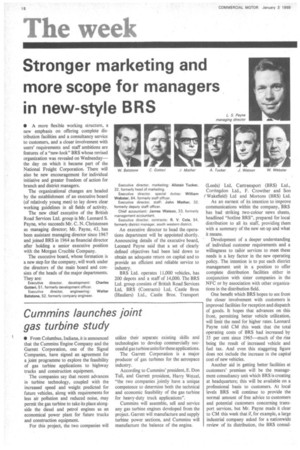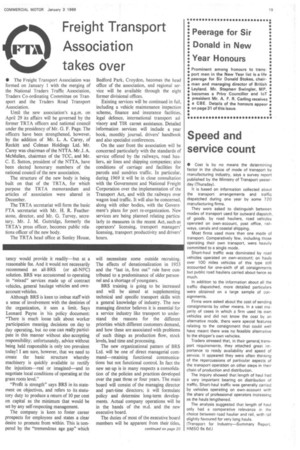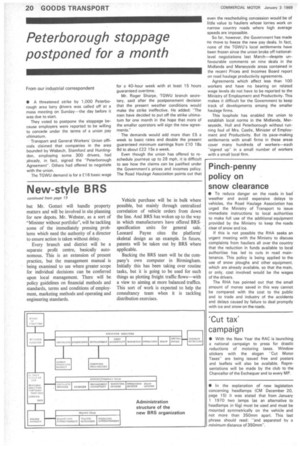Stronger marketing and more scope for managers
Page 20

Page 21

Page 22

If you've noticed an error in this article please click here to report it so we can fix it.
in new-style BRS L S. Payne
• A more flexible working structure, a new emphasis on offering complete distribution facilities and a consultancy service to customers, and a closer involvement with users' requirements and staff ambitions are features of a "new-look" BRS whose revised organization was revealed on Wednesday— the day on which it became part of the National Freight Corporation. There will also be new encouragement for individual initiative and greater freedom of action for branch and district managers.
The organizational changes are headed by the establishment of an executive board (of relatively young men) to lay down clear working guidelines in all fields of activity.
The new chief executive of the British Road Services Ltd. group is Mr. Leonard S. Payne, who succeeds Mr. C. N. Christensen as managing director; Mr. Payne, 43, has been assistant managing director since 1967 and joined BRS in 1964 as financial director after holding a senior executive position with the Morgan Crucible Company.
The executive board, whose formation is a new step for the company, will work under the directors of the main board and consists of the heads of the major departments. They are:
Executive director. development: Charles Gotten. 51, formerly development officer.
Executive director, engineering: Walter Batstone, 52, formerly company engineer. Executive director. marketing: Alistair Tucker, 32, formerly head of marketing.
Executive director, special duties: William Webster, 64, formerly staff officer.
Executive director, staff: John Mather, 32, formerly deputy staff officer.
Chief accountant: James Watson, 33, formerly management accountant.
Executive director, contracts: R. V. Cole, 54, formerly district manager, south western district.
An executive director to head the operations department will be appointed shortly. Announcing details of the executive board, Leonard Payne said that a set of clearly defined objectives had been laid down to obtain an adequate return on capital and to provide an efficient and reliable service to industry.
BRS Ltd. operates 11,000 vehicles, has 200 depots and a staff of 14,000. The BRS Ltd. group consists of British Road Services Ltd, BRS (Contracts) Ltd, Castle Bros (Hauliers) Ltd., Castle Bros. Transport (Leeds) Ltd, Cartransport (BRS) Ltd., Corringdon Ltd., F. Crowther and Son (Wakefield) Ltd and Mortons (BRS) Ltd. As an earnest of its intention to improve communications within the company, BRS has had striking two-colour news sheets, headlined "hotline BRS", prepared for local distribution to all its staff, providing them with a summary of the new set-up and what it means.
Development of a deeper understanding of individual customer requirements and a willingness to tailor services to meet these needs is a key factor in the new operating policy. The intention is to put each district management unit in a position to offer complete distribution facilities either in conjunction with sister companies in the NFC or by association with other organizations in the distribution field.
One benefit which BRS hopes to see from the closer involvement with customers is improved facilities for reception and dispatch of goods. It hopes that advances on this front, permitting better vehicle utilization, will limit the need for higher rates. Leonard Payne told CM this week that the total operating costs of BRS had increased by 35 per cent since 1965—much of the rise being the result of increased vehicle and fuel tax. And even this staggering figure does not include the increase in the capital cost of new vehicles.
Another aid in getting better facilities at customers' premises will be the management consultancy unit which BRS is creating at headquarters; this will be available on a professional basis to customers. At local levels BRS will continue to provide the normal amount of free advice to customers and potential customers concerning transport services, but Mr. Payne made it clear to CM this week that if, for example, a large industrial company asked for a nationwide review of its distribution, the BRS consul tancy would provide it readily—but at a reasonable fee. And it would not necessarily recommend an all-BRS (or all-NFC) solution. BRS was accustomed to operating in "mixed" services made up of contract vehicles, general haulage vehicles and ownaccount vehicles.
Although BRS is keen to imbue staff with a sense of involvement with the destinies of the organization, it sees a limit. Says Leonard Payne in his policy document: "There is much loose talk about worker participation meaning decisions on day to day operating, but no one can really participate in this manner without also accepting responsibility; unfortunately, advice without being held responsible is only too prevalent today! I am sure, however, that we need to create the basic structure whereby machinery is quickly available to rectify the injustices—real or imagined—and to negotiate local conditions of operating at the grass roots level."
"Profit is strength" says BRS in its statement on objectives, and refers to its statutory duty to produce a return of 10 per cent on capital as the minimum that would be set by any self-respecting management.
The company is keen to foster career prospects for employees and states a clear desire to promote from within. This is tempered by the "tremendous age gap" which will necessitate some outside recruiting. The effects of denationalization in 1953 and the "last in, first out" rule have contributed to a predominance of older personnel and a shortage of youngsters.
BRS training is going to be increased and will be aimed at supplementing technical and specific transport skills with a general knowledge of industry. The new managing director believes it is essential for a service industry like transport to understand the reasons for the different priorities which different customers demand, and how these are associated with problems of such things as production flow, stock levels, lead time and processing.
The new organizational pattern of BRS Ltd. will be one of direct managerial command—retaining functional communications but not functional control. In fact the new set-up is in many respects a consolidation of the policies and practices developed over the past three or four years. The main board will consist of the managing director and part-time directors; it will formulate policy and determine long-term developments. Actual company operations will be in the hands of the m.d. and the new executive board.
The duties of most of the executive board members will be apparent from their titles, but Mr. Gotteri will handle property matters and will be involved in site planning for new depots. Mr. Webster, as a sort of "Minister without portfolio", will be tackling some of the immediately pressing problems which need the authority of a director to ensure action is taken without delay.
Every branch and district will be a separate profit centre, basically autonomous. This is an extension of present practice, but the management manual is being examined to see where greater scope for individual decisions can be conferred upon local management. There will be. policy guidelines on financial methods and standards, terms and conditions of employment, marketing methods and operating and engineering standards. Vehicle purchase will be in bulk where possible, but mainly through centralized correlation of vehicle orders from down the line. And BRS has woken up to the way in which manufacturers have offered BRSspecification units for general sale. Leonard Payne cites the platform/ skeletal design as an example. In future, patents will be taken out by BRS where applicable.
Backing the BRS team will be the company's own computer in Birmingham. Initially this has been taking over routine tasks, but it is going to be used for such things as plotting freight traffic flows—with a view to aiming at more balanced traffics. This sort of work is expected to help the consultancy team when it is tackling distribution exercises.




























































































